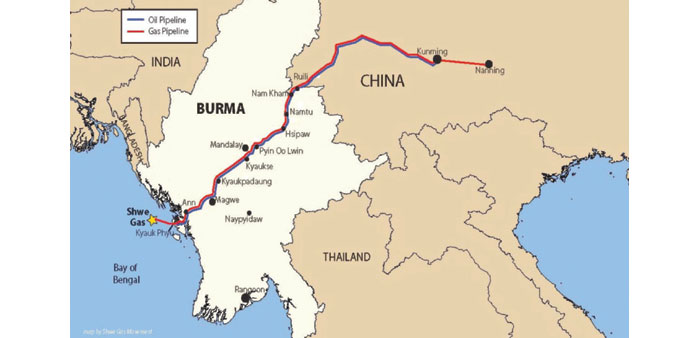By Arno Maierbrugger
It should have been a new pan-Asian transport corridor from the Middle East to China: The Myanmar-Yunnan railway, a $20bn project supported by Beijing that would have connected Myanmar’s western coast with China’s southwestern province of Yunnan and the rest of China — a trade route that would have cut transport times from the Middle East and Western countries to China significantly and boosted trade enormously. However, the project was officially cancelled on July 18 by the Myanmar government, citing “public opposition” against the railway line. This means, the Memorandum of Understanding signed by the two nations in April 2011 is now void and no construction will start for the time being. The planned line would have passed through Myanmar’s troubled coastal Rakhine state and northeastern Shan state before crossing the border into Yunnan province in southwestern China. The line, which was planned to run parallel to two oil and gas pipelines, would have had significant strategic importance to China as an alternative to the Strait of Malacca as a trade route to the Middle East and beyond. Under the agreement, the China Railway Engineering Corp has earmarked the entire $20bn for the railway’s construction costs and would have been granted the right to manage and operate the railway for 50 years. However, opposition against the project came up that seems to be mixture of anti-China sentiment in Myanmar and objections from civil rights groups, villagers and the general public who are outraged that Myanmar is shipping its natural resources across the country to China while most of rural Myanmar doesn’t have any electricity supply or other infrastructural amenities. Other opponents criticised the railway project for expelling too many communities along the track, and some political parties and ethnic groups saw a risk to national security in it. China has so far not officially commented on the stalled project, but observers said that it would be a significant drawback for China’s trade within Southeast Asia and the Middle East if the project would not materialise. Furthermore, it would also put a brake on the progress on the planned railway network between Europe and Asia, Zhao Jian, a professor at Beijing’s Jiaotong University, pointed out. Behind the scenes, Chinese officials are now obviously trying to revive the project, emphasising the fact that China is Myanmar’s biggest source of investment and the nation’s most important trading partner, seemingly pushing the Myanmar government to enter a new agreement for the 1,215km railway project. China’s ambassador to Myanmar, Yang Houlan, was quoted by China’s official news agency Xinhua as saying that while the project “has run into difficulties”, it was not abandoned from the Chinese side. “China-Myanmar relations are experiencing more opportunities, but there also emerge some challenges,” the ambassador said, diplomatically. There is also an understanding that the Myanmar government does not see the $20bn-bill for constructing the railway and granting a 50-year concession as sufficient, and allegedly some “coordination talks” on a new contract are going on between the two parties.
Bangkok

